Entrepreneurial Ventures Report: Entrepreneurship and Small Business
VerifiedAdded on 2022/11/24
|14
|4268
|190
Report
AI Summary
This report on Entrepreneurship and Small Business Management delves into various aspects of entrepreneurial ventures. It begins by defining entrepreneurship and exploring different types of ventures, including small businesses, scalable start-ups, social enterprises, and large business entrepreneurs. The report then examines the similarities and differences between these ventures, followed by an analysis of the impact of micro and small businesses on the UK economy, supported by relevant data and statistics. It highlights the importance of small businesses and start-ups in the growth of the social economy. Furthermore, the report identifies the characteristics, traits, and skills that differentiate successful entrepreneurs from other business managers, and explores how background and experience can influence entrepreneurial endeavors. The report concludes with a summary of the key findings and provides a list of references.
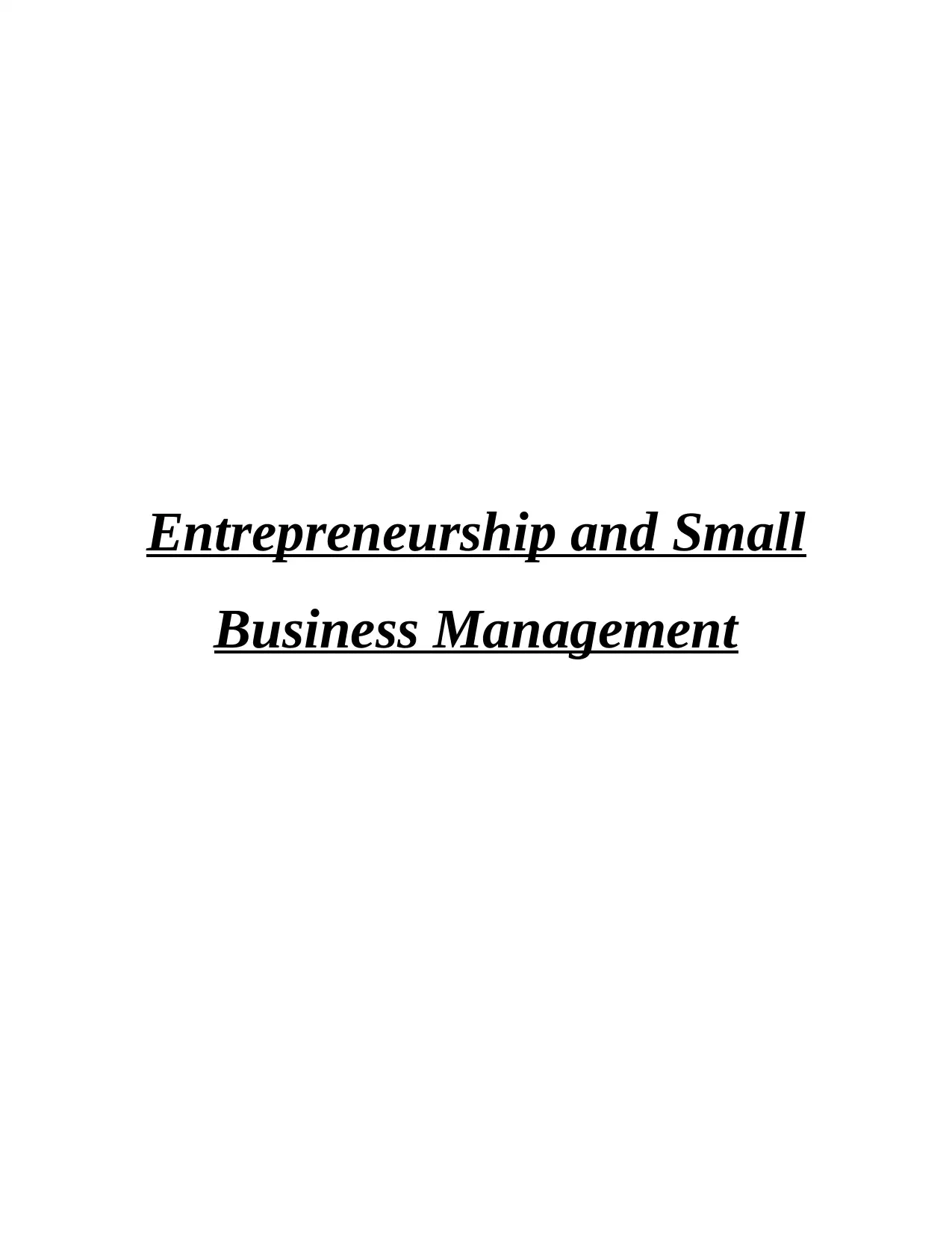
Entrepreneurship and Small
Business Management
Business Management
Paraphrase This Document
Need a fresh take? Get an instant paraphrase of this document with our AI Paraphraser
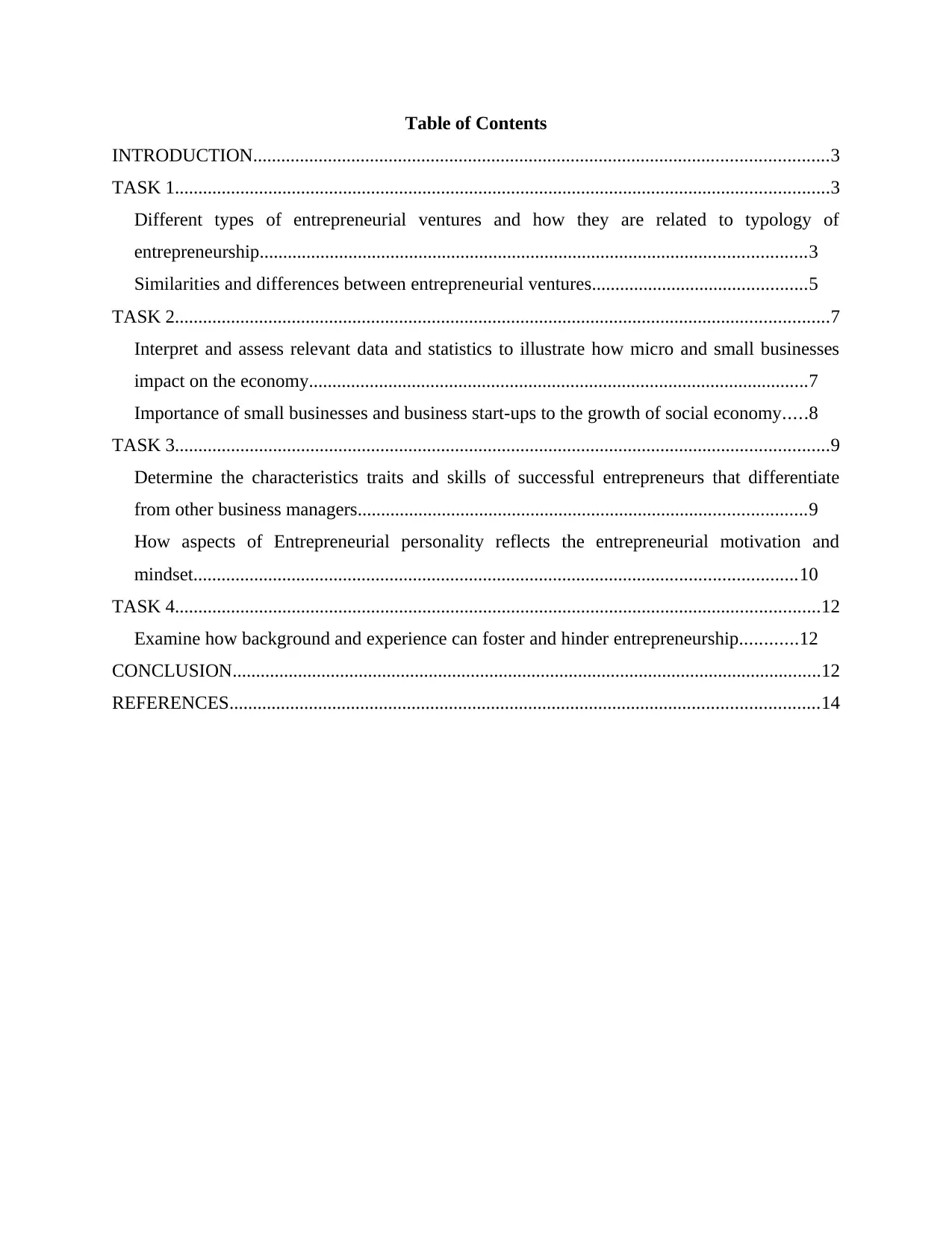
Table of Contents
INTRODUCTION...........................................................................................................................3
TASK 1............................................................................................................................................3
Different types of entrepreneurial ventures and how they are related to typology of
entrepreneurship.....................................................................................................................3
Similarities and differences between entrepreneurial ventures..............................................5
TASK 2............................................................................................................................................7
Interpret and assess relevant data and statistics to illustrate how micro and small businesses
impact on the economy...........................................................................................................7
Importance of small businesses and business start-ups to the growth of social economy.....8
TASK 3............................................................................................................................................9
Determine the characteristics traits and skills of successful entrepreneurs that differentiate
from other business managers................................................................................................9
How aspects of Entrepreneurial personality reflects the entrepreneurial motivation and
mindset.................................................................................................................................10
TASK 4..........................................................................................................................................12
Examine how background and experience can foster and hinder entrepreneurship............12
CONCLUSION..............................................................................................................................12
REFERENCES..............................................................................................................................14
INTRODUCTION...........................................................................................................................3
TASK 1............................................................................................................................................3
Different types of entrepreneurial ventures and how they are related to typology of
entrepreneurship.....................................................................................................................3
Similarities and differences between entrepreneurial ventures..............................................5
TASK 2............................................................................................................................................7
Interpret and assess relevant data and statistics to illustrate how micro and small businesses
impact on the economy...........................................................................................................7
Importance of small businesses and business start-ups to the growth of social economy.....8
TASK 3............................................................................................................................................9
Determine the characteristics traits and skills of successful entrepreneurs that differentiate
from other business managers................................................................................................9
How aspects of Entrepreneurial personality reflects the entrepreneurial motivation and
mindset.................................................................................................................................10
TASK 4..........................................................................................................................................12
Examine how background and experience can foster and hinder entrepreneurship............12
CONCLUSION..............................................................................................................................12
REFERENCES..............................................................................................................................14
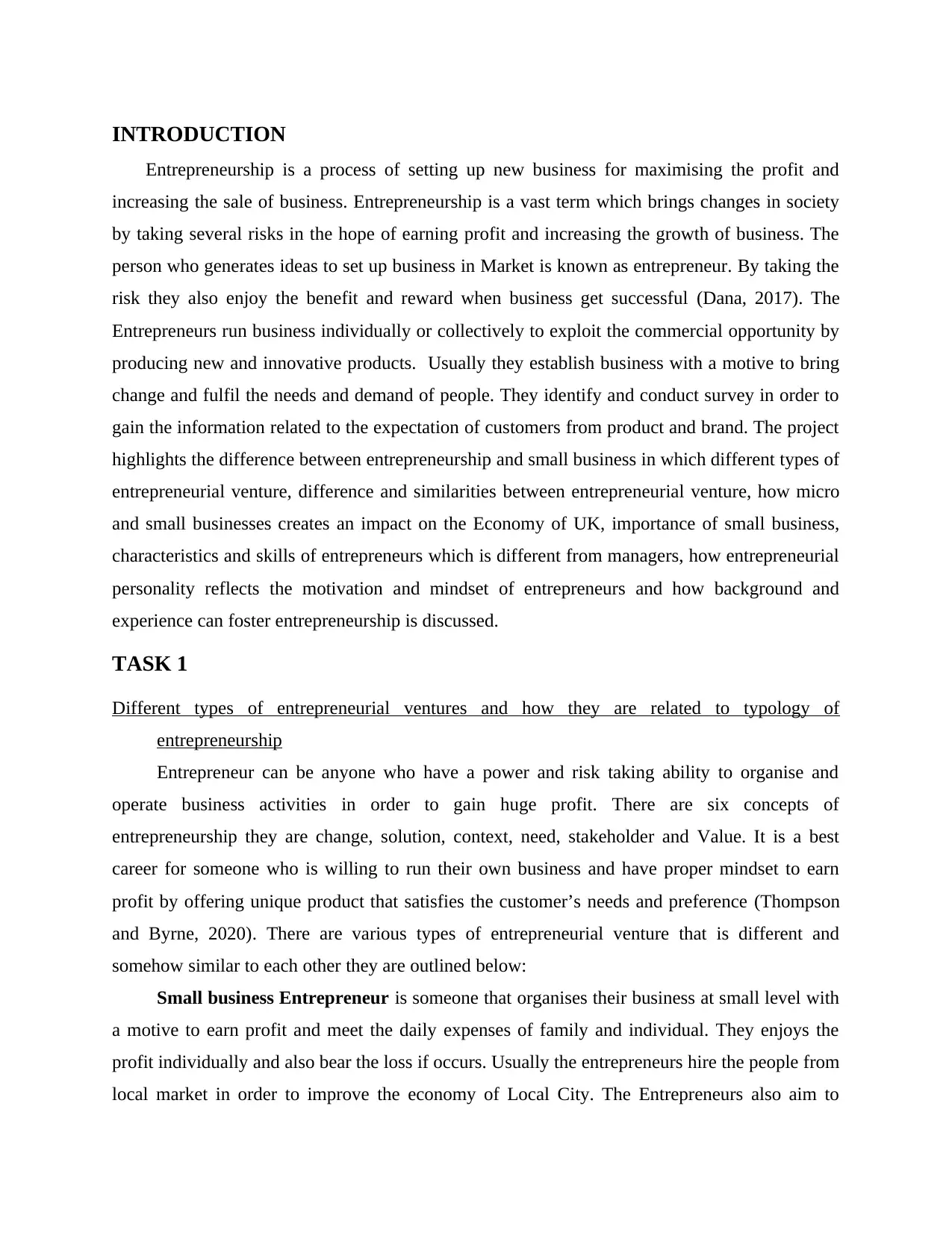
INTRODUCTION
Entrepreneurship is a process of setting up new business for maximising the profit and
increasing the sale of business. Entrepreneurship is a vast term which brings changes in society
by taking several risks in the hope of earning profit and increasing the growth of business. The
person who generates ideas to set up business in Market is known as entrepreneur. By taking the
risk they also enjoy the benefit and reward when business get successful (Dana, 2017). The
Entrepreneurs run business individually or collectively to exploit the commercial opportunity by
producing new and innovative products. Usually they establish business with a motive to bring
change and fulfil the needs and demand of people. They identify and conduct survey in order to
gain the information related to the expectation of customers from product and brand. The project
highlights the difference between entrepreneurship and small business in which different types of
entrepreneurial venture, difference and similarities between entrepreneurial venture, how micro
and small businesses creates an impact on the Economy of UK, importance of small business,
characteristics and skills of entrepreneurs which is different from managers, how entrepreneurial
personality reflects the motivation and mindset of entrepreneurs and how background and
experience can foster entrepreneurship is discussed.
TASK 1
Different types of entrepreneurial ventures and how they are related to typology of
entrepreneurship
Entrepreneur can be anyone who have a power and risk taking ability to organise and
operate business activities in order to gain huge profit. There are six concepts of
entrepreneurship they are change, solution, context, need, stakeholder and Value. It is a best
career for someone who is willing to run their own business and have proper mindset to earn
profit by offering unique product that satisfies the customer’s needs and preference (Thompson
and Byrne, 2020). There are various types of entrepreneurial venture that is different and
somehow similar to each other they are outlined below:
Small business Entrepreneur is someone that organises their business at small level with
a motive to earn profit and meet the daily expenses of family and individual. They enjoys the
profit individually and also bear the loss if occurs. Usually the entrepreneurs hire the people from
local market in order to improve the economy of Local City. The Entrepreneurs also aim to
Entrepreneurship is a process of setting up new business for maximising the profit and
increasing the sale of business. Entrepreneurship is a vast term which brings changes in society
by taking several risks in the hope of earning profit and increasing the growth of business. The
person who generates ideas to set up business in Market is known as entrepreneur. By taking the
risk they also enjoy the benefit and reward when business get successful (Dana, 2017). The
Entrepreneurs run business individually or collectively to exploit the commercial opportunity by
producing new and innovative products. Usually they establish business with a motive to bring
change and fulfil the needs and demand of people. They identify and conduct survey in order to
gain the information related to the expectation of customers from product and brand. The project
highlights the difference between entrepreneurship and small business in which different types of
entrepreneurial venture, difference and similarities between entrepreneurial venture, how micro
and small businesses creates an impact on the Economy of UK, importance of small business,
characteristics and skills of entrepreneurs which is different from managers, how entrepreneurial
personality reflects the motivation and mindset of entrepreneurs and how background and
experience can foster entrepreneurship is discussed.
TASK 1
Different types of entrepreneurial ventures and how they are related to typology of
entrepreneurship
Entrepreneur can be anyone who have a power and risk taking ability to organise and
operate business activities in order to gain huge profit. There are six concepts of
entrepreneurship they are change, solution, context, need, stakeholder and Value. It is a best
career for someone who is willing to run their own business and have proper mindset to earn
profit by offering unique product that satisfies the customer’s needs and preference (Thompson
and Byrne, 2020). There are various types of entrepreneurial venture that is different and
somehow similar to each other they are outlined below:
Small business Entrepreneur is someone that organises their business at small level with
a motive to earn profit and meet the daily expenses of family and individual. They enjoys the
profit individually and also bear the loss if occurs. Usually the entrepreneurs hire the people from
local market in order to improve the economy of Local City. The Entrepreneurs also aim to
⊘ This is a preview!⊘
Do you want full access?
Subscribe today to unlock all pages.

Trusted by 1+ million students worldwide
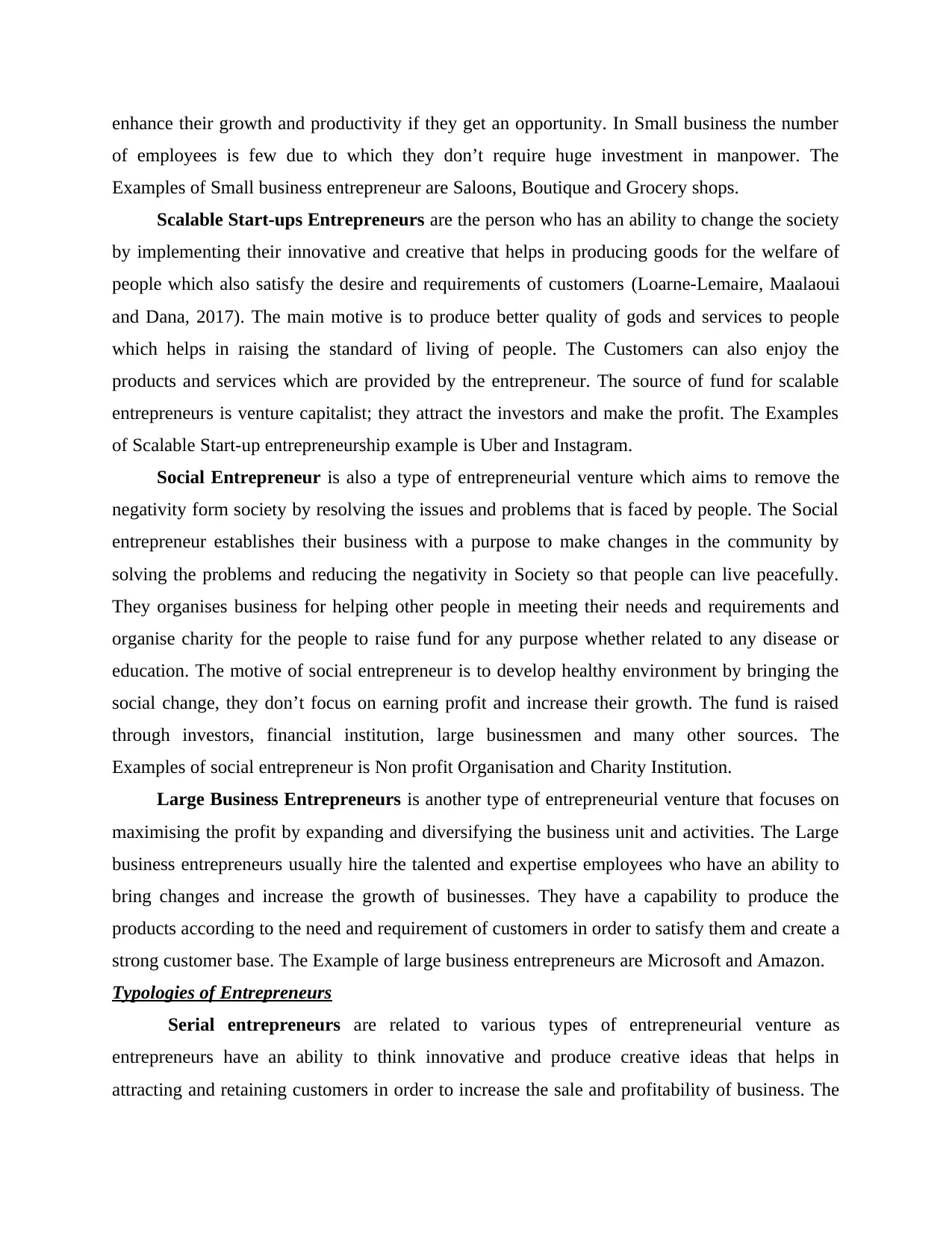
enhance their growth and productivity if they get an opportunity. In Small business the number
of employees is few due to which they don’t require huge investment in manpower. The
Examples of Small business entrepreneur are Saloons, Boutique and Grocery shops.
Scalable Start-ups Entrepreneurs are the person who has an ability to change the society
by implementing their innovative and creative that helps in producing goods for the welfare of
people which also satisfy the desire and requirements of customers (Loarne-Lemaire, Maalaoui
and Dana, 2017). The main motive is to produce better quality of gods and services to people
which helps in raising the standard of living of people. The Customers can also enjoy the
products and services which are provided by the entrepreneur. The source of fund for scalable
entrepreneurs is venture capitalist; they attract the investors and make the profit. The Examples
of Scalable Start-up entrepreneurship example is Uber and Instagram.
Social Entrepreneur is also a type of entrepreneurial venture which aims to remove the
negativity form society by resolving the issues and problems that is faced by people. The Social
entrepreneur establishes their business with a purpose to make changes in the community by
solving the problems and reducing the negativity in Society so that people can live peacefully.
They organises business for helping other people in meeting their needs and requirements and
organise charity for the people to raise fund for any purpose whether related to any disease or
education. The motive of social entrepreneur is to develop healthy environment by bringing the
social change, they don’t focus on earning profit and increase their growth. The fund is raised
through investors, financial institution, large businessmen and many other sources. The
Examples of social entrepreneur is Non profit Organisation and Charity Institution.
Large Business Entrepreneurs is another type of entrepreneurial venture that focuses on
maximising the profit by expanding and diversifying the business unit and activities. The Large
business entrepreneurs usually hire the talented and expertise employees who have an ability to
bring changes and increase the growth of businesses. They have a capability to produce the
products according to the need and requirement of customers in order to satisfy them and create a
strong customer base. The Example of large business entrepreneurs are Microsoft and Amazon.
Typologies of Entrepreneurs
Serial entrepreneurs are related to various types of entrepreneurial venture as
entrepreneurs have an ability to think innovative and produce creative ideas that helps in
attracting and retaining customers in order to increase the sale and profitability of business. The
of employees is few due to which they don’t require huge investment in manpower. The
Examples of Small business entrepreneur are Saloons, Boutique and Grocery shops.
Scalable Start-ups Entrepreneurs are the person who has an ability to change the society
by implementing their innovative and creative that helps in producing goods for the welfare of
people which also satisfy the desire and requirements of customers (Loarne-Lemaire, Maalaoui
and Dana, 2017). The main motive is to produce better quality of gods and services to people
which helps in raising the standard of living of people. The Customers can also enjoy the
products and services which are provided by the entrepreneur. The source of fund for scalable
entrepreneurs is venture capitalist; they attract the investors and make the profit. The Examples
of Scalable Start-up entrepreneurship example is Uber and Instagram.
Social Entrepreneur is also a type of entrepreneurial venture which aims to remove the
negativity form society by resolving the issues and problems that is faced by people. The Social
entrepreneur establishes their business with a purpose to make changes in the community by
solving the problems and reducing the negativity in Society so that people can live peacefully.
They organises business for helping other people in meeting their needs and requirements and
organise charity for the people to raise fund for any purpose whether related to any disease or
education. The motive of social entrepreneur is to develop healthy environment by bringing the
social change, they don’t focus on earning profit and increase their growth. The fund is raised
through investors, financial institution, large businessmen and many other sources. The
Examples of social entrepreneur is Non profit Organisation and Charity Institution.
Large Business Entrepreneurs is another type of entrepreneurial venture that focuses on
maximising the profit by expanding and diversifying the business unit and activities. The Large
business entrepreneurs usually hire the talented and expertise employees who have an ability to
bring changes and increase the growth of businesses. They have a capability to produce the
products according to the need and requirement of customers in order to satisfy them and create a
strong customer base. The Example of large business entrepreneurs are Microsoft and Amazon.
Typologies of Entrepreneurs
Serial entrepreneurs are related to various types of entrepreneurial venture as
entrepreneurs have an ability to think innovative and produce creative ideas that helps in
attracting and retaining customers in order to increase the sale and profitability of business. The
Paraphrase This Document
Need a fresh take? Get an instant paraphrase of this document with our AI Paraphraser
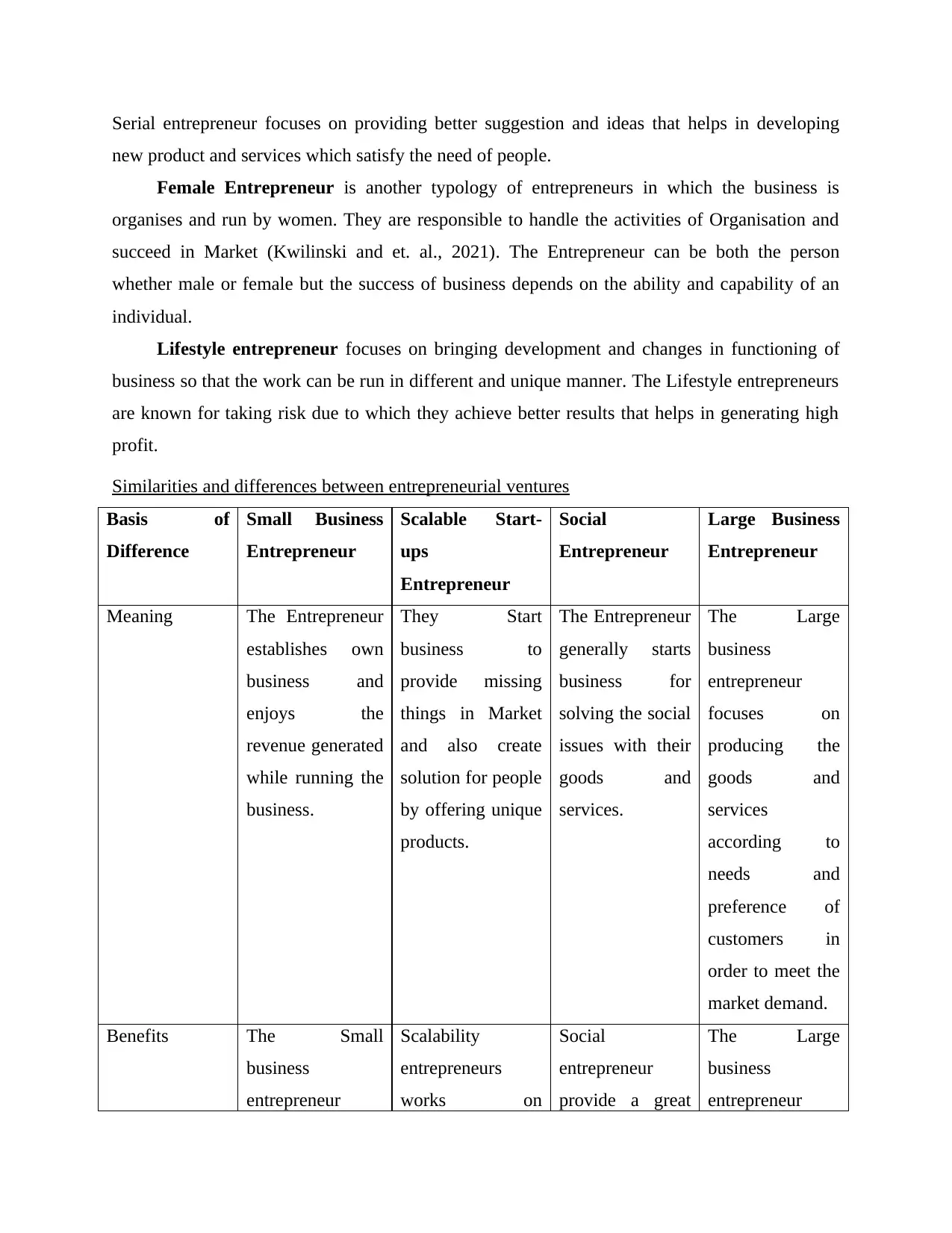
Serial entrepreneur focuses on providing better suggestion and ideas that helps in developing
new product and services which satisfy the need of people.
Female Entrepreneur is another typology of entrepreneurs in which the business is
organises and run by women. They are responsible to handle the activities of Organisation and
succeed in Market (Kwilinski and et. al., 2021). The Entrepreneur can be both the person
whether male or female but the success of business depends on the ability and capability of an
individual.
Lifestyle entrepreneur focuses on bringing development and changes in functioning of
business so that the work can be run in different and unique manner. The Lifestyle entrepreneurs
are known for taking risk due to which they achieve better results that helps in generating high
profit.
Similarities and differences between entrepreneurial ventures
Basis of
Difference
Small Business
Entrepreneur
Scalable Start-
ups
Entrepreneur
Social
Entrepreneur
Large Business
Entrepreneur
Meaning The Entrepreneur
establishes own
business and
enjoys the
revenue generated
while running the
business.
They Start
business to
provide missing
things in Market
and also create
solution for people
by offering unique
products.
The Entrepreneur
generally starts
business for
solving the social
issues with their
goods and
services.
The Large
business
entrepreneur
focuses on
producing the
goods and
services
according to
needs and
preference of
customers in
order to meet the
market demand.
Benefits The Small
business
entrepreneur
Scalability
entrepreneurs
works on
Social
entrepreneur
provide a great
The Large
business
entrepreneur
new product and services which satisfy the need of people.
Female Entrepreneur is another typology of entrepreneurs in which the business is
organises and run by women. They are responsible to handle the activities of Organisation and
succeed in Market (Kwilinski and et. al., 2021). The Entrepreneur can be both the person
whether male or female but the success of business depends on the ability and capability of an
individual.
Lifestyle entrepreneur focuses on bringing development and changes in functioning of
business so that the work can be run in different and unique manner. The Lifestyle entrepreneurs
are known for taking risk due to which they achieve better results that helps in generating high
profit.
Similarities and differences between entrepreneurial ventures
Basis of
Difference
Small Business
Entrepreneur
Scalable Start-
ups
Entrepreneur
Social
Entrepreneur
Large Business
Entrepreneur
Meaning The Entrepreneur
establishes own
business and
enjoys the
revenue generated
while running the
business.
They Start
business to
provide missing
things in Market
and also create
solution for people
by offering unique
products.
The Entrepreneur
generally starts
business for
solving the social
issues with their
goods and
services.
The Large
business
entrepreneur
focuses on
producing the
goods and
services
according to
needs and
preference of
customers in
order to meet the
market demand.
Benefits The Small
business
entrepreneur
Scalability
entrepreneurs
works on
Social
entrepreneur
provide a great
The Large
business
entrepreneur
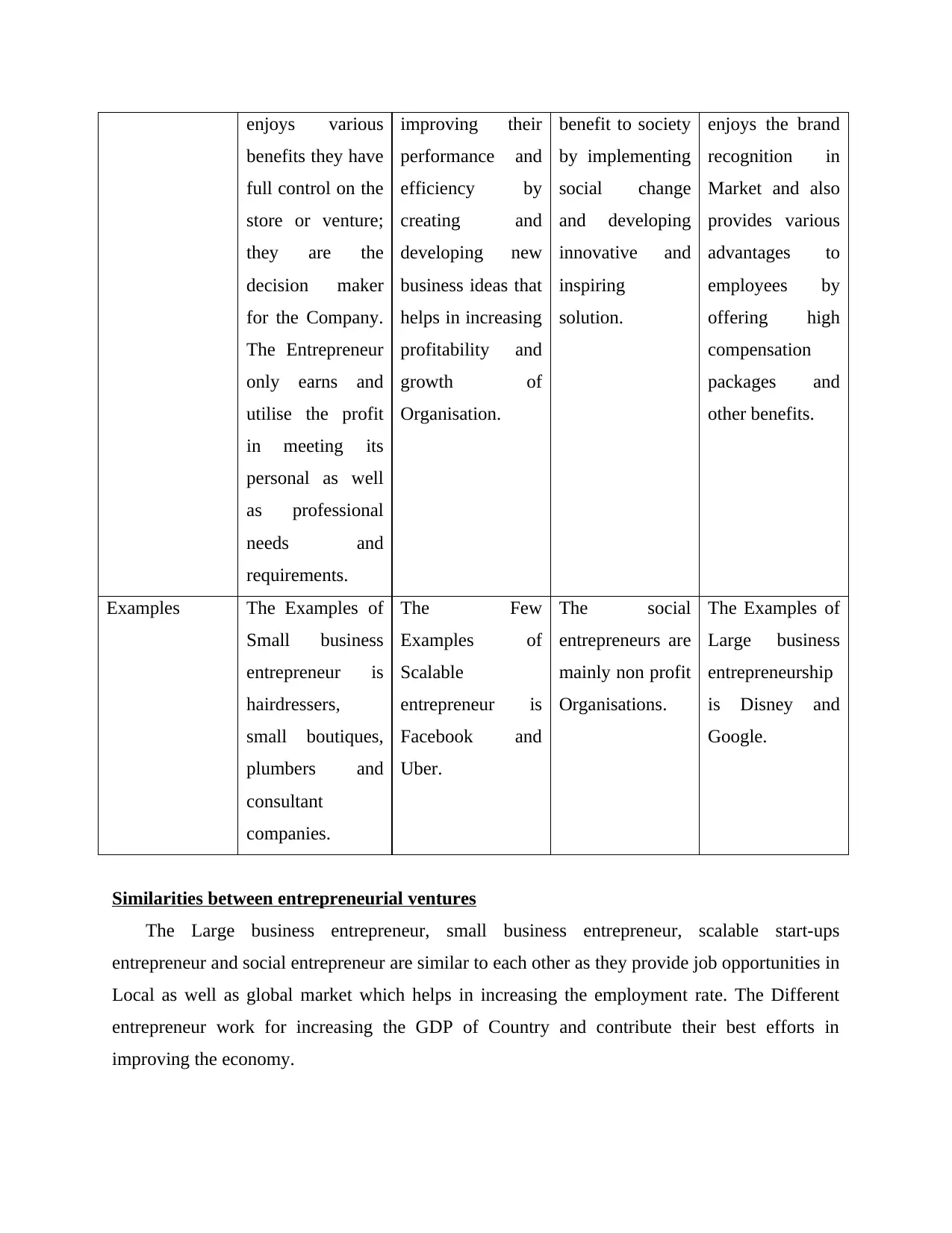
enjoys various
benefits they have
full control on the
store or venture;
they are the
decision maker
for the Company.
The Entrepreneur
only earns and
utilise the profit
in meeting its
personal as well
as professional
needs and
requirements.
improving their
performance and
efficiency by
creating and
developing new
business ideas that
helps in increasing
profitability and
growth of
Organisation.
benefit to society
by implementing
social change
and developing
innovative and
inspiring
solution.
enjoys the brand
recognition in
Market and also
provides various
advantages to
employees by
offering high
compensation
packages and
other benefits.
Examples The Examples of
Small business
entrepreneur is
hairdressers,
small boutiques,
plumbers and
consultant
companies.
The Few
Examples of
Scalable
entrepreneur is
Facebook and
Uber.
The social
entrepreneurs are
mainly non profit
Organisations.
The Examples of
Large business
entrepreneurship
is Disney and
Google.
Similarities between entrepreneurial ventures
The Large business entrepreneur, small business entrepreneur, scalable start-ups
entrepreneur and social entrepreneur are similar to each other as they provide job opportunities in
Local as well as global market which helps in increasing the employment rate. The Different
entrepreneur work for increasing the GDP of Country and contribute their best efforts in
improving the economy.
benefits they have
full control on the
store or venture;
they are the
decision maker
for the Company.
The Entrepreneur
only earns and
utilise the profit
in meeting its
personal as well
as professional
needs and
requirements.
improving their
performance and
efficiency by
creating and
developing new
business ideas that
helps in increasing
profitability and
growth of
Organisation.
benefit to society
by implementing
social change
and developing
innovative and
inspiring
solution.
enjoys the brand
recognition in
Market and also
provides various
advantages to
employees by
offering high
compensation
packages and
other benefits.
Examples The Examples of
Small business
entrepreneur is
hairdressers,
small boutiques,
plumbers and
consultant
companies.
The Few
Examples of
Scalable
entrepreneur is
Facebook and
Uber.
The social
entrepreneurs are
mainly non profit
Organisations.
The Examples of
Large business
entrepreneurship
is Disney and
Google.
Similarities between entrepreneurial ventures
The Large business entrepreneur, small business entrepreneur, scalable start-ups
entrepreneur and social entrepreneur are similar to each other as they provide job opportunities in
Local as well as global market which helps in increasing the employment rate. The Different
entrepreneur work for increasing the GDP of Country and contribute their best efforts in
improving the economy.
⊘ This is a preview!⊘
Do you want full access?
Subscribe today to unlock all pages.

Trusted by 1+ million students worldwide
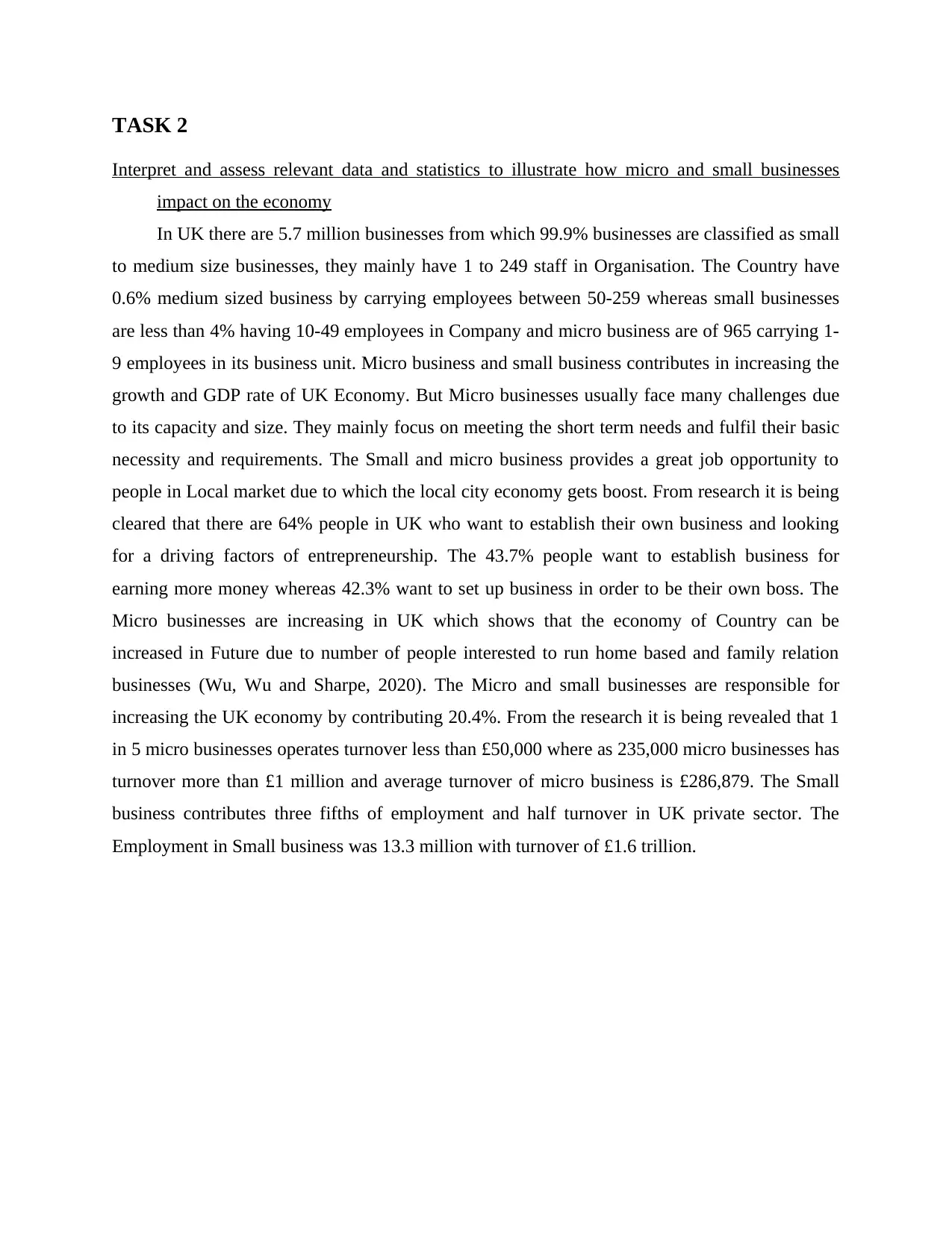
TASK 2
Interpret and assess relevant data and statistics to illustrate how micro and small businesses
impact on the economy
In UK there are 5.7 million businesses from which 99.9% businesses are classified as small
to medium size businesses, they mainly have 1 to 249 staff in Organisation. The Country have
0.6% medium sized business by carrying employees between 50-259 whereas small businesses
are less than 4% having 10-49 employees in Company and micro business are of 965 carrying 1-
9 employees in its business unit. Micro business and small business contributes in increasing the
growth and GDP rate of UK Economy. But Micro businesses usually face many challenges due
to its capacity and size. They mainly focus on meeting the short term needs and fulfil their basic
necessity and requirements. The Small and micro business provides a great job opportunity to
people in Local market due to which the local city economy gets boost. From research it is being
cleared that there are 64% people in UK who want to establish their own business and looking
for a driving factors of entrepreneurship. The 43.7% people want to establish business for
earning more money whereas 42.3% want to set up business in order to be their own boss. The
Micro businesses are increasing in UK which shows that the economy of Country can be
increased in Future due to number of people interested to run home based and family relation
businesses (Wu, Wu and Sharpe, 2020). The Micro and small businesses are responsible for
increasing the UK economy by contributing 20.4%. From the research it is being revealed that 1
in 5 micro businesses operates turnover less than £50,000 where as 235,000 micro businesses has
turnover more than £1 million and average turnover of micro business is £286,879. The Small
business contributes three fifths of employment and half turnover in UK private sector. The
Employment in Small business was 13.3 million with turnover of £1.6 trillion.
Interpret and assess relevant data and statistics to illustrate how micro and small businesses
impact on the economy
In UK there are 5.7 million businesses from which 99.9% businesses are classified as small
to medium size businesses, they mainly have 1 to 249 staff in Organisation. The Country have
0.6% medium sized business by carrying employees between 50-259 whereas small businesses
are less than 4% having 10-49 employees in Company and micro business are of 965 carrying 1-
9 employees in its business unit. Micro business and small business contributes in increasing the
growth and GDP rate of UK Economy. But Micro businesses usually face many challenges due
to its capacity and size. They mainly focus on meeting the short term needs and fulfil their basic
necessity and requirements. The Small and micro business provides a great job opportunity to
people in Local market due to which the local city economy gets boost. From research it is being
cleared that there are 64% people in UK who want to establish their own business and looking
for a driving factors of entrepreneurship. The 43.7% people want to establish business for
earning more money whereas 42.3% want to set up business in order to be their own boss. The
Micro businesses are increasing in UK which shows that the economy of Country can be
increased in Future due to number of people interested to run home based and family relation
businesses (Wu, Wu and Sharpe, 2020). The Micro and small businesses are responsible for
increasing the UK economy by contributing 20.4%. From the research it is being revealed that 1
in 5 micro businesses operates turnover less than £50,000 where as 235,000 micro businesses has
turnover more than £1 million and average turnover of micro business is £286,879. The Small
business contributes three fifths of employment and half turnover in UK private sector. The
Employment in Small business was 13.3 million with turnover of £1.6 trillion.
Paraphrase This Document
Need a fresh take? Get an instant paraphrase of this document with our AI Paraphraser
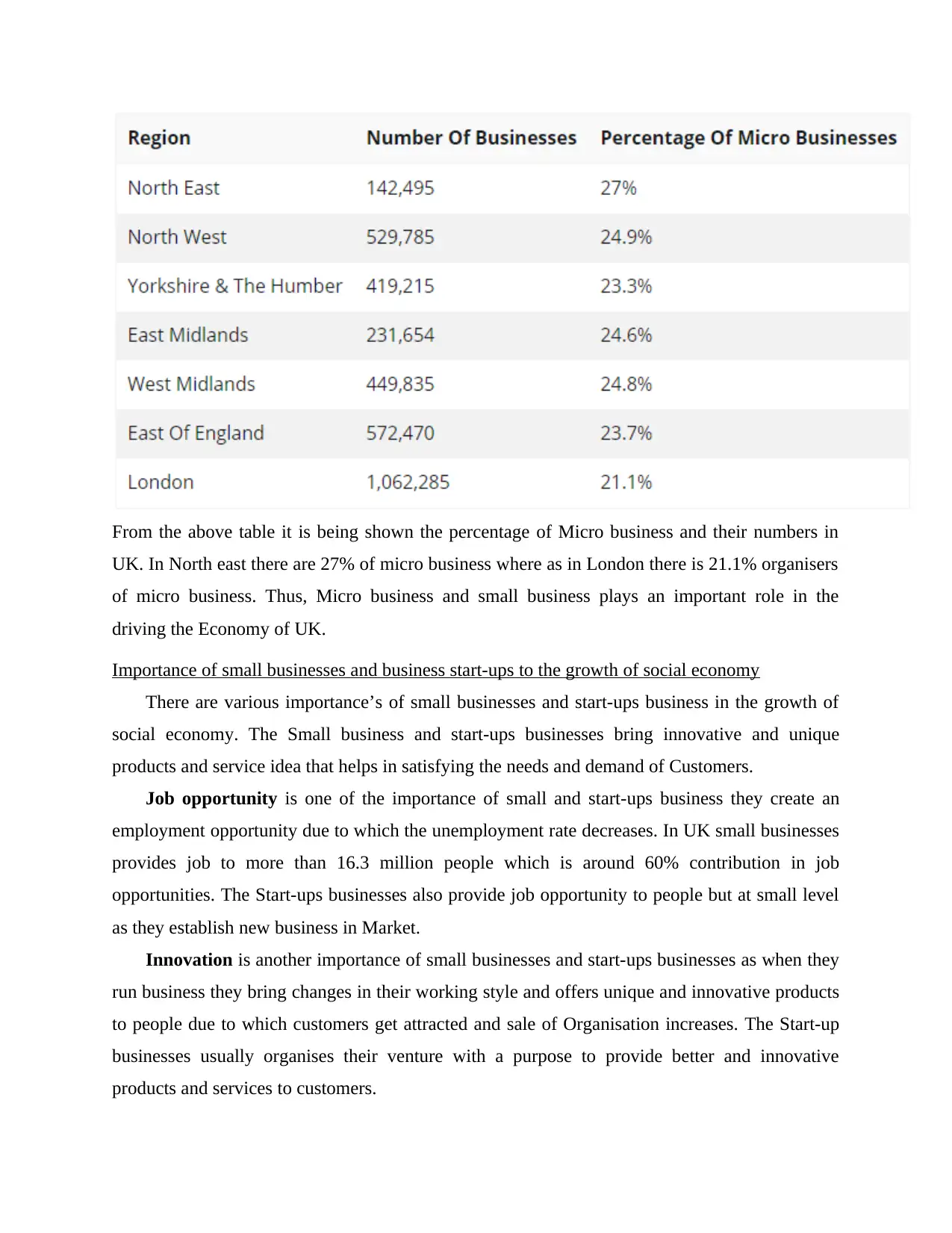
From the above table it is being shown the percentage of Micro business and their numbers in
UK. In North east there are 27% of micro business where as in London there is 21.1% organisers
of micro business. Thus, Micro business and small business plays an important role in the
driving the Economy of UK.
Importance of small businesses and business start-ups to the growth of social economy
There are various importance’s of small businesses and start-ups business in the growth of
social economy. The Small business and start-ups businesses bring innovative and unique
products and service idea that helps in satisfying the needs and demand of Customers.
Job opportunity is one of the importance of small and start-ups business they create an
employment opportunity due to which the unemployment rate decreases. In UK small businesses
provides job to more than 16.3 million people which is around 60% contribution in job
opportunities. The Start-ups businesses also provide job opportunity to people but at small level
as they establish new business in Market.
Innovation is another importance of small businesses and start-ups businesses as when they
run business they bring changes in their working style and offers unique and innovative products
to people due to which customers get attracted and sale of Organisation increases. The Start-up
businesses usually organises their venture with a purpose to provide better and innovative
products and services to customers.
UK. In North east there are 27% of micro business where as in London there is 21.1% organisers
of micro business. Thus, Micro business and small business plays an important role in the
driving the Economy of UK.
Importance of small businesses and business start-ups to the growth of social economy
There are various importance’s of small businesses and start-ups business in the growth of
social economy. The Small business and start-ups businesses bring innovative and unique
products and service idea that helps in satisfying the needs and demand of Customers.
Job opportunity is one of the importance of small and start-ups business they create an
employment opportunity due to which the unemployment rate decreases. In UK small businesses
provides job to more than 16.3 million people which is around 60% contribution in job
opportunities. The Start-ups businesses also provide job opportunity to people but at small level
as they establish new business in Market.
Innovation is another importance of small businesses and start-ups businesses as when they
run business they bring changes in their working style and offers unique and innovative products
to people due to which customers get attracted and sale of Organisation increases. The Start-up
businesses usually organises their venture with a purpose to provide better and innovative
products and services to customers.
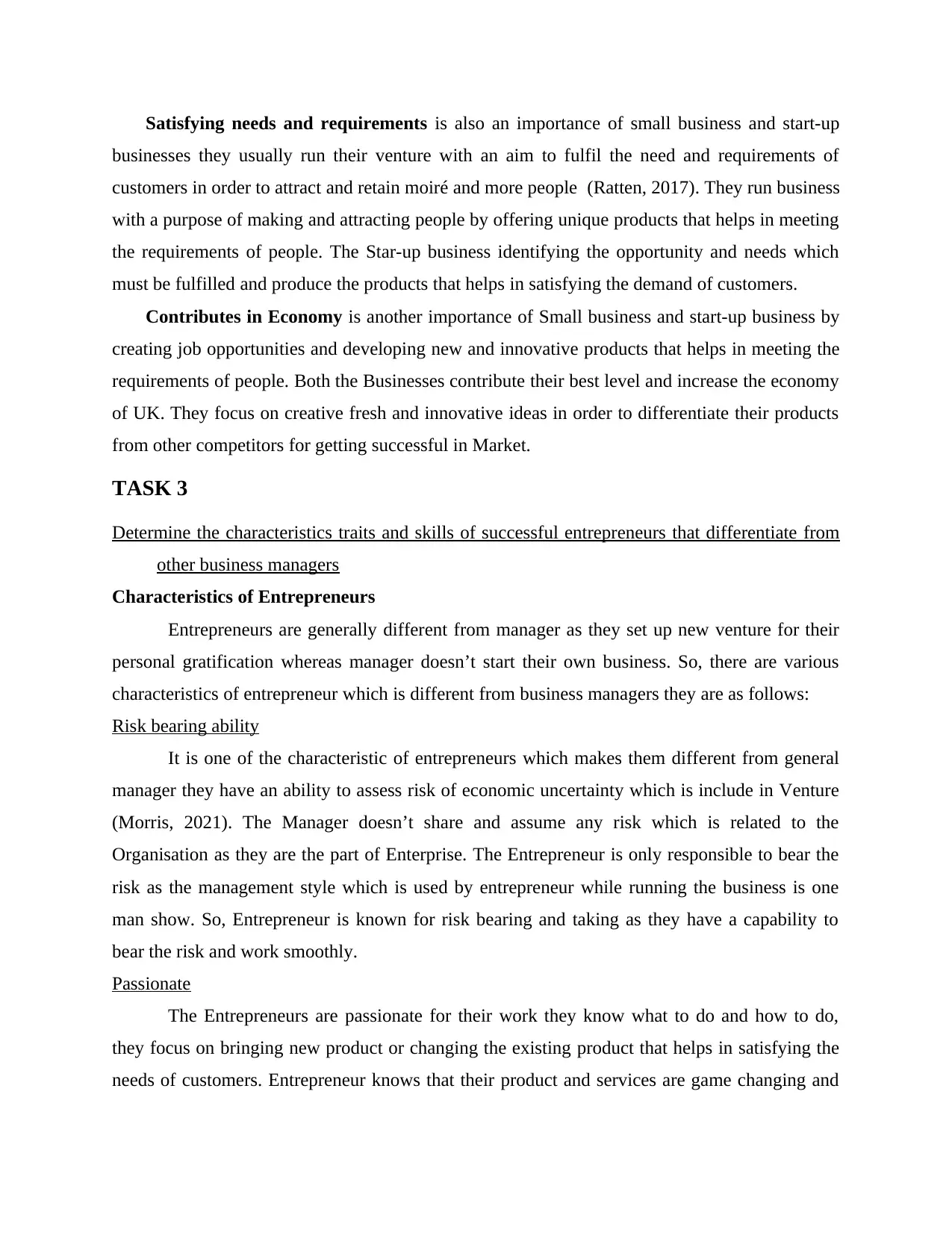
Satisfying needs and requirements is also an importance of small business and start-up
businesses they usually run their venture with an aim to fulfil the need and requirements of
customers in order to attract and retain moiré and more people (Ratten, 2017). They run business
with a purpose of making and attracting people by offering unique products that helps in meeting
the requirements of people. The Star-up business identifying the opportunity and needs which
must be fulfilled and produce the products that helps in satisfying the demand of customers.
Contributes in Economy is another importance of Small business and start-up business by
creating job opportunities and developing new and innovative products that helps in meeting the
requirements of people. Both the Businesses contribute their best level and increase the economy
of UK. They focus on creative fresh and innovative ideas in order to differentiate their products
from other competitors for getting successful in Market.
TASK 3
Determine the characteristics traits and skills of successful entrepreneurs that differentiate from
other business managers
Characteristics of Entrepreneurs
Entrepreneurs are generally different from manager as they set up new venture for their
personal gratification whereas manager doesn’t start their own business. So, there are various
characteristics of entrepreneur which is different from business managers they are as follows:
Risk bearing ability
It is one of the characteristic of entrepreneurs which makes them different from general
manager they have an ability to assess risk of economic uncertainty which is include in Venture
(Morris, 2021). The Manager doesn’t share and assume any risk which is related to the
Organisation as they are the part of Enterprise. The Entrepreneur is only responsible to bear the
risk as the management style which is used by entrepreneur while running the business is one
man show. So, Entrepreneur is known for risk bearing and taking as they have a capability to
bear the risk and work smoothly.
Passionate
The Entrepreneurs are passionate for their work they know what to do and how to do,
they focus on bringing new product or changing the existing product that helps in satisfying the
needs of customers. Entrepreneur knows that their product and services are game changing and
businesses they usually run their venture with an aim to fulfil the need and requirements of
customers in order to attract and retain moiré and more people (Ratten, 2017). They run business
with a purpose of making and attracting people by offering unique products that helps in meeting
the requirements of people. The Star-up business identifying the opportunity and needs which
must be fulfilled and produce the products that helps in satisfying the demand of customers.
Contributes in Economy is another importance of Small business and start-up business by
creating job opportunities and developing new and innovative products that helps in meeting the
requirements of people. Both the Businesses contribute their best level and increase the economy
of UK. They focus on creative fresh and innovative ideas in order to differentiate their products
from other competitors for getting successful in Market.
TASK 3
Determine the characteristics traits and skills of successful entrepreneurs that differentiate from
other business managers
Characteristics of Entrepreneurs
Entrepreneurs are generally different from manager as they set up new venture for their
personal gratification whereas manager doesn’t start their own business. So, there are various
characteristics of entrepreneur which is different from business managers they are as follows:
Risk bearing ability
It is one of the characteristic of entrepreneurs which makes them different from general
manager they have an ability to assess risk of economic uncertainty which is include in Venture
(Morris, 2021). The Manager doesn’t share and assume any risk which is related to the
Organisation as they are the part of Enterprise. The Entrepreneur is only responsible to bear the
risk as the management style which is used by entrepreneur while running the business is one
man show. So, Entrepreneur is known for risk bearing and taking as they have a capability to
bear the risk and work smoothly.
Passionate
The Entrepreneurs are passionate for their work they know what to do and how to do,
they focus on bringing new product or changing the existing product that helps in satisfying the
needs of customers. Entrepreneur knows that their product and services are game changing and
⊘ This is a preview!⊘
Do you want full access?
Subscribe today to unlock all pages.

Trusted by 1+ million students worldwide
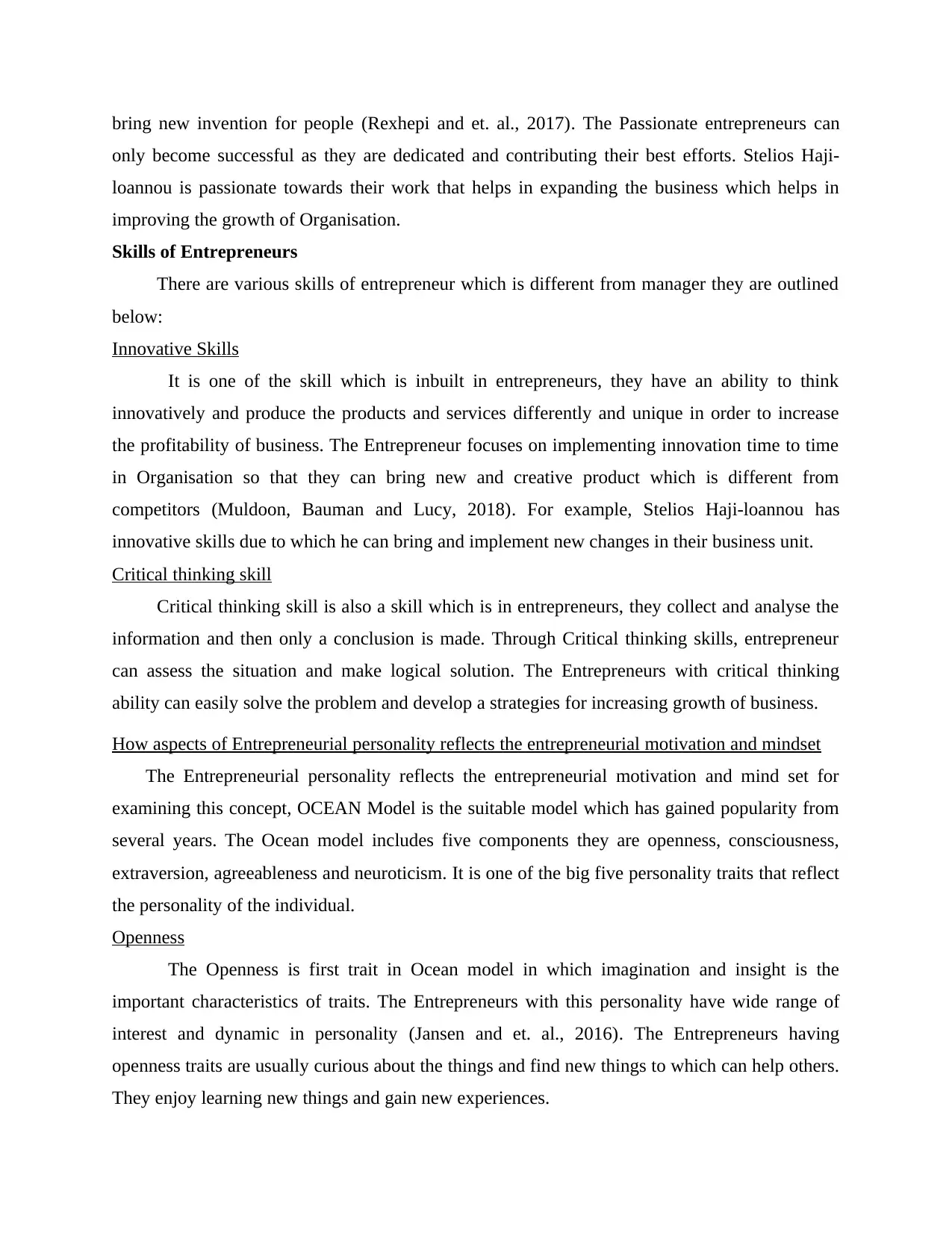
bring new invention for people (Rexhepi and et. al., 2017). The Passionate entrepreneurs can
only become successful as they are dedicated and contributing their best efforts. Stelios Haji-
loannou is passionate towards their work that helps in expanding the business which helps in
improving the growth of Organisation.
Skills of Entrepreneurs
There are various skills of entrepreneur which is different from manager they are outlined
below:
Innovative Skills
It is one of the skill which is inbuilt in entrepreneurs, they have an ability to think
innovatively and produce the products and services differently and unique in order to increase
the profitability of business. The Entrepreneur focuses on implementing innovation time to time
in Organisation so that they can bring new and creative product which is different from
competitors (Muldoon, Bauman and Lucy, 2018). For example, Stelios Haji-loannou has
innovative skills due to which he can bring and implement new changes in their business unit.
Critical thinking skill
Critical thinking skill is also a skill which is in entrepreneurs, they collect and analyse the
information and then only a conclusion is made. Through Critical thinking skills, entrepreneur
can assess the situation and make logical solution. The Entrepreneurs with critical thinking
ability can easily solve the problem and develop a strategies for increasing growth of business.
How aspects of Entrepreneurial personality reflects the entrepreneurial motivation and mindset
The Entrepreneurial personality reflects the entrepreneurial motivation and mind set for
examining this concept, OCEAN Model is the suitable model which has gained popularity from
several years. The Ocean model includes five components they are openness, consciousness,
extraversion, agreeableness and neuroticism. It is one of the big five personality traits that reflect
the personality of the individual.
Openness
The Openness is first trait in Ocean model in which imagination and insight is the
important characteristics of traits. The Entrepreneurs with this personality have wide range of
interest and dynamic in personality (Jansen and et. al., 2016). The Entrepreneurs having
openness traits are usually curious about the things and find new things to which can help others.
They enjoy learning new things and gain new experiences.
only become successful as they are dedicated and contributing their best efforts. Stelios Haji-
loannou is passionate towards their work that helps in expanding the business which helps in
improving the growth of Organisation.
Skills of Entrepreneurs
There are various skills of entrepreneur which is different from manager they are outlined
below:
Innovative Skills
It is one of the skill which is inbuilt in entrepreneurs, they have an ability to think
innovatively and produce the products and services differently and unique in order to increase
the profitability of business. The Entrepreneur focuses on implementing innovation time to time
in Organisation so that they can bring new and creative product which is different from
competitors (Muldoon, Bauman and Lucy, 2018). For example, Stelios Haji-loannou has
innovative skills due to which he can bring and implement new changes in their business unit.
Critical thinking skill
Critical thinking skill is also a skill which is in entrepreneurs, they collect and analyse the
information and then only a conclusion is made. Through Critical thinking skills, entrepreneur
can assess the situation and make logical solution. The Entrepreneurs with critical thinking
ability can easily solve the problem and develop a strategies for increasing growth of business.
How aspects of Entrepreneurial personality reflects the entrepreneurial motivation and mindset
The Entrepreneurial personality reflects the entrepreneurial motivation and mind set for
examining this concept, OCEAN Model is the suitable model which has gained popularity from
several years. The Ocean model includes five components they are openness, consciousness,
extraversion, agreeableness and neuroticism. It is one of the big five personality traits that reflect
the personality of the individual.
Openness
The Openness is first trait in Ocean model in which imagination and insight is the
important characteristics of traits. The Entrepreneurs with this personality have wide range of
interest and dynamic in personality (Jansen and et. al., 2016). The Entrepreneurs having
openness traits are usually curious about the things and find new things to which can help others.
They enjoy learning new things and gain new experiences.
Paraphrase This Document
Need a fresh take? Get an instant paraphrase of this document with our AI Paraphraser
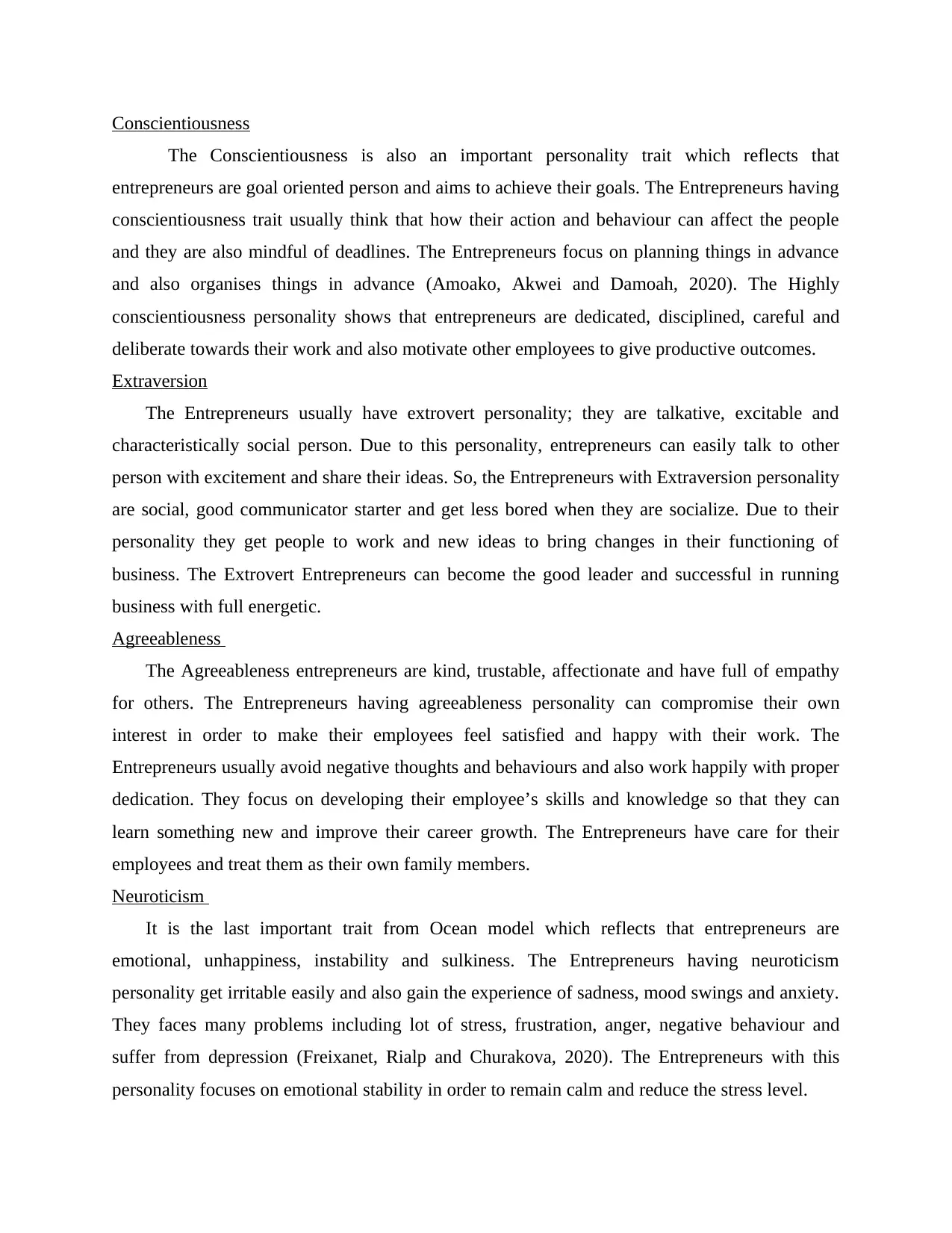
Conscientiousness
The Conscientiousness is also an important personality trait which reflects that
entrepreneurs are goal oriented person and aims to achieve their goals. The Entrepreneurs having
conscientiousness trait usually think that how their action and behaviour can affect the people
and they are also mindful of deadlines. The Entrepreneurs focus on planning things in advance
and also organises things in advance (Amoako, Akwei and Damoah, 2020). The Highly
conscientiousness personality shows that entrepreneurs are dedicated, disciplined, careful and
deliberate towards their work and also motivate other employees to give productive outcomes.
Extraversion
The Entrepreneurs usually have extrovert personality; they are talkative, excitable and
characteristically social person. Due to this personality, entrepreneurs can easily talk to other
person with excitement and share their ideas. So, the Entrepreneurs with Extraversion personality
are social, good communicator starter and get less bored when they are socialize. Due to their
personality they get people to work and new ideas to bring changes in their functioning of
business. The Extrovert Entrepreneurs can become the good leader and successful in running
business with full energetic.
Agreeableness
The Agreeableness entrepreneurs are kind, trustable, affectionate and have full of empathy
for others. The Entrepreneurs having agreeableness personality can compromise their own
interest in order to make their employees feel satisfied and happy with their work. The
Entrepreneurs usually avoid negative thoughts and behaviours and also work happily with proper
dedication. They focus on developing their employee’s skills and knowledge so that they can
learn something new and improve their career growth. The Entrepreneurs have care for their
employees and treat them as their own family members.
Neuroticism
It is the last important trait from Ocean model which reflects that entrepreneurs are
emotional, unhappiness, instability and sulkiness. The Entrepreneurs having neuroticism
personality get irritable easily and also gain the experience of sadness, mood swings and anxiety.
They faces many problems including lot of stress, frustration, anger, negative behaviour and
suffer from depression (Freixanet, Rialp and Churakova, 2020). The Entrepreneurs with this
personality focuses on emotional stability in order to remain calm and reduce the stress level.
The Conscientiousness is also an important personality trait which reflects that
entrepreneurs are goal oriented person and aims to achieve their goals. The Entrepreneurs having
conscientiousness trait usually think that how their action and behaviour can affect the people
and they are also mindful of deadlines. The Entrepreneurs focus on planning things in advance
and also organises things in advance (Amoako, Akwei and Damoah, 2020). The Highly
conscientiousness personality shows that entrepreneurs are dedicated, disciplined, careful and
deliberate towards their work and also motivate other employees to give productive outcomes.
Extraversion
The Entrepreneurs usually have extrovert personality; they are talkative, excitable and
characteristically social person. Due to this personality, entrepreneurs can easily talk to other
person with excitement and share their ideas. So, the Entrepreneurs with Extraversion personality
are social, good communicator starter and get less bored when they are socialize. Due to their
personality they get people to work and new ideas to bring changes in their functioning of
business. The Extrovert Entrepreneurs can become the good leader and successful in running
business with full energetic.
Agreeableness
The Agreeableness entrepreneurs are kind, trustable, affectionate and have full of empathy
for others. The Entrepreneurs having agreeableness personality can compromise their own
interest in order to make their employees feel satisfied and happy with their work. The
Entrepreneurs usually avoid negative thoughts and behaviours and also work happily with proper
dedication. They focus on developing their employee’s skills and knowledge so that they can
learn something new and improve their career growth. The Entrepreneurs have care for their
employees and treat them as their own family members.
Neuroticism
It is the last important trait from Ocean model which reflects that entrepreneurs are
emotional, unhappiness, instability and sulkiness. The Entrepreneurs having neuroticism
personality get irritable easily and also gain the experience of sadness, mood swings and anxiety.
They faces many problems including lot of stress, frustration, anger, negative behaviour and
suffer from depression (Freixanet, Rialp and Churakova, 2020). The Entrepreneurs with this
personality focuses on emotional stability in order to remain calm and reduce the stress level.
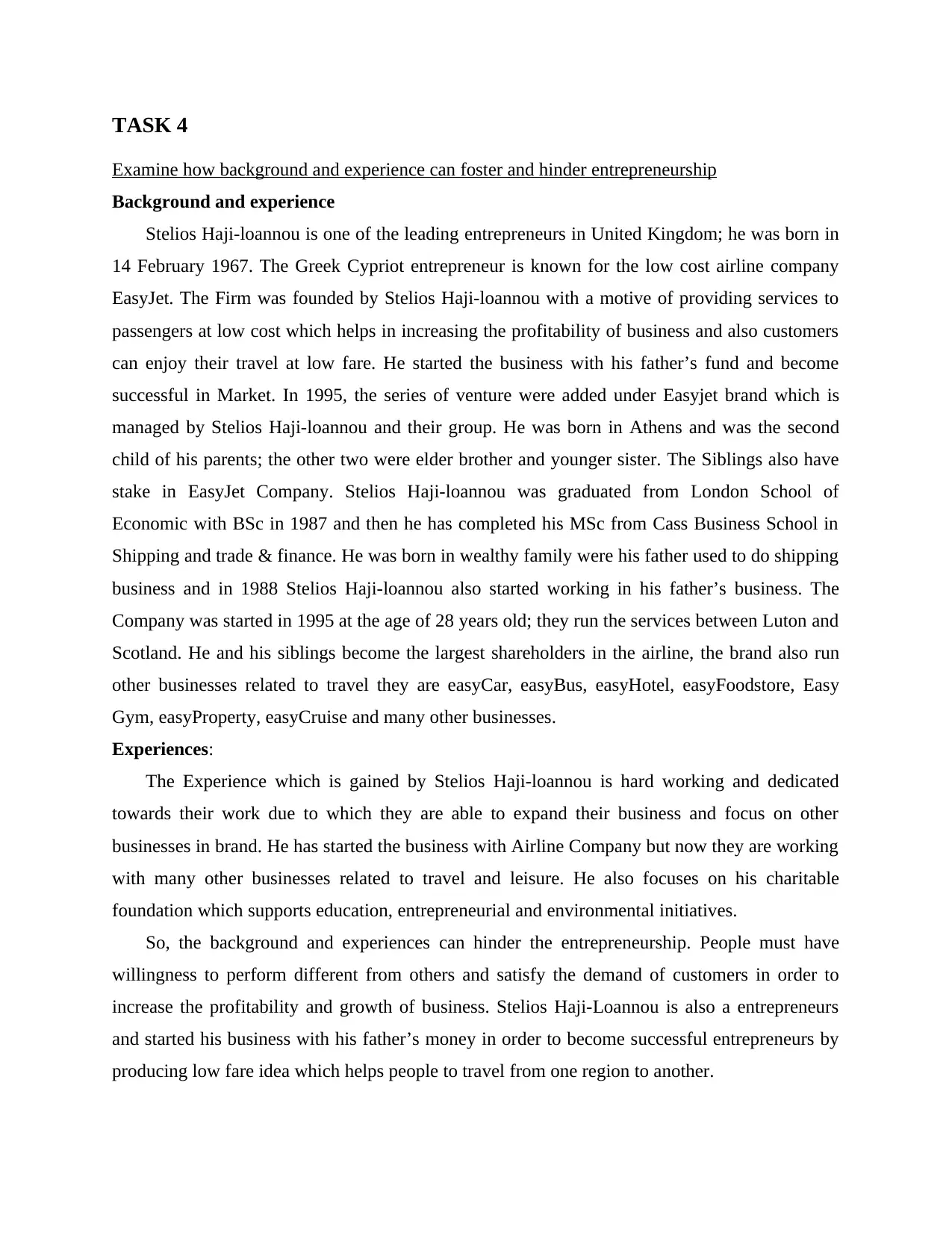
TASK 4
Examine how background and experience can foster and hinder entrepreneurship
Background and experience
Stelios Haji-loannou is one of the leading entrepreneurs in United Kingdom; he was born in
14 February 1967. The Greek Cypriot entrepreneur is known for the low cost airline company
EasyJet. The Firm was founded by Stelios Haji-loannou with a motive of providing services to
passengers at low cost which helps in increasing the profitability of business and also customers
can enjoy their travel at low fare. He started the business with his father’s fund and become
successful in Market. In 1995, the series of venture were added under Easyjet brand which is
managed by Stelios Haji-loannou and their group. He was born in Athens and was the second
child of his parents; the other two were elder brother and younger sister. The Siblings also have
stake in EasyJet Company. Stelios Haji-loannou was graduated from London School of
Economic with BSc in 1987 and then he has completed his MSc from Cass Business School in
Shipping and trade & finance. He was born in wealthy family were his father used to do shipping
business and in 1988 Stelios Haji-loannou also started working in his father’s business. The
Company was started in 1995 at the age of 28 years old; they run the services between Luton and
Scotland. He and his siblings become the largest shareholders in the airline, the brand also run
other businesses related to travel they are easyCar, easyBus, easyHotel, easyFoodstore, Easy
Gym, easyProperty, easyCruise and many other businesses.
Experiences:
The Experience which is gained by Stelios Haji-loannou is hard working and dedicated
towards their work due to which they are able to expand their business and focus on other
businesses in brand. He has started the business with Airline Company but now they are working
with many other businesses related to travel and leisure. He also focuses on his charitable
foundation which supports education, entrepreneurial and environmental initiatives.
So, the background and experiences can hinder the entrepreneurship. People must have
willingness to perform different from others and satisfy the demand of customers in order to
increase the profitability and growth of business. Stelios Haji-Loannou is also a entrepreneurs
and started his business with his father’s money in order to become successful entrepreneurs by
producing low fare idea which helps people to travel from one region to another.
Examine how background and experience can foster and hinder entrepreneurship
Background and experience
Stelios Haji-loannou is one of the leading entrepreneurs in United Kingdom; he was born in
14 February 1967. The Greek Cypriot entrepreneur is known for the low cost airline company
EasyJet. The Firm was founded by Stelios Haji-loannou with a motive of providing services to
passengers at low cost which helps in increasing the profitability of business and also customers
can enjoy their travel at low fare. He started the business with his father’s fund and become
successful in Market. In 1995, the series of venture were added under Easyjet brand which is
managed by Stelios Haji-loannou and their group. He was born in Athens and was the second
child of his parents; the other two were elder brother and younger sister. The Siblings also have
stake in EasyJet Company. Stelios Haji-loannou was graduated from London School of
Economic with BSc in 1987 and then he has completed his MSc from Cass Business School in
Shipping and trade & finance. He was born in wealthy family were his father used to do shipping
business and in 1988 Stelios Haji-loannou also started working in his father’s business. The
Company was started in 1995 at the age of 28 years old; they run the services between Luton and
Scotland. He and his siblings become the largest shareholders in the airline, the brand also run
other businesses related to travel they are easyCar, easyBus, easyHotel, easyFoodstore, Easy
Gym, easyProperty, easyCruise and many other businesses.
Experiences:
The Experience which is gained by Stelios Haji-loannou is hard working and dedicated
towards their work due to which they are able to expand their business and focus on other
businesses in brand. He has started the business with Airline Company but now they are working
with many other businesses related to travel and leisure. He also focuses on his charitable
foundation which supports education, entrepreneurial and environmental initiatives.
So, the background and experiences can hinder the entrepreneurship. People must have
willingness to perform different from others and satisfy the demand of customers in order to
increase the profitability and growth of business. Stelios Haji-Loannou is also a entrepreneurs
and started his business with his father’s money in order to become successful entrepreneurs by
producing low fare idea which helps people to travel from one region to another.
⊘ This is a preview!⊘
Do you want full access?
Subscribe today to unlock all pages.

Trusted by 1+ million students worldwide
1 out of 14
Related Documents
Your All-in-One AI-Powered Toolkit for Academic Success.
+13062052269
info@desklib.com
Available 24*7 on WhatsApp / Email
![[object Object]](/_next/static/media/star-bottom.7253800d.svg)
Unlock your academic potential
Copyright © 2020–2026 A2Z Services. All Rights Reserved. Developed and managed by ZUCOL.
![Entrepreneurship and Small Business Impact Report - [University Name]](/_next/image/?url=https%3A%2F%2Fdesklib.com%2Fmedia%2Fimages%2Fwj%2Fd1f42599211847658d3fd556aa563fa5.jpg&w=256&q=75)



